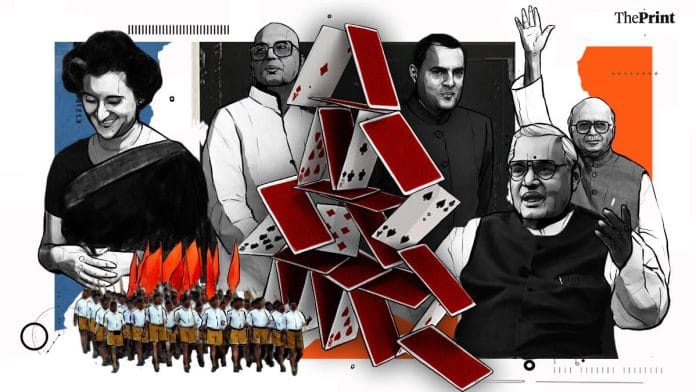Thank you dear subscribers, we are overwhelmed with your response.
Your Turn is a unique section from ThePrint featuring points of view from its subscribers. If you are a subscriber, have a point of view, please send it to us. If not, do subscribe here: https://theprint.in/subscribe/
The “American Deep State” narrative in Indian politics is often exaggerated, deeply rooted in Russian propaganda that ironically misled Prime Minister Indira Gandhi. This disinformation fueled mistrust and division in democratic societies, much like the hidden agendas explored in “Star Trek VI: The Undiscovered Country,” where secret factions manipulate events to sabotage peace. Similarly, “Star Trek II: The Wrath of Khan,” highlights how distorted narratives and unchecked power can lead to tragic outcomes. These themes resonate with the ways propaganda has twisted perceptions and driven conflict, both in fiction and in reality.
Russian Propaganda and Indira Gandhi: A Historical Perspective
During the Cold War, the Soviet Union conducted widespread disinformation campaigns, with India being a key target. The KGB, particularly during Prime Minister Indira Gandhi’s tenure, exerted considerable influence, exploiting India’s suspicions of the West. The Soviets, adept at propaganda, positioned themselves as India’s allies, portraying the U.S. as a neocolonial force destabilizing global order.
Indira Gandhi, already wary of Western intentions, was particularly vulnerable to this narrative. The KGB infiltrated various layers of Indian governance to ensure India remained aligned with Soviet interests and distanced from the U.S. One of the most effective narratives was the concept of an “American Deep State” undermining India’s sovereignty. Ironically, this notion, which became entrenched in Indian political discourse, was not the result of American actions but of Russian deception. Indira Gandhi, like many leaders of her time, was manipulated into seeing the U.S. as the orchestrator of global instability.
What she didn’t realize is who in 1979 first invaded Afghanistan? It was the Russians.
Maybe the real deep state was in the regime of Indira Gandhi!
The real “Deep State” in India was embodied by Indira Gandhi’s regime. While the Congress Party failed to act during the 1962 Sino-Indian War, it was JFK who came to India’s aid. Indira Gandhi’s tenure saw tragic events, including the use of IAF bomber jets against Mizoram in 1966 and the brutal Operation Blue Star against Sikhs in the early ’80s. The violence that followed, including the exodus of Kukis from Mizoram to Manipur and the genocide of Sikhs, led to the Khalistan movement, all traceable to her policies.
While JFK saved India, from becoming Tibet, we foolishly blame the US!
The “Deep State” Allegations: A Misplaced Notion! What if it stares Indians in the Mirror?
Today, the idea of an American Deep State has resurfaced in both the U.S. and India, often twisted to serve various agendas. The claims that George Soros, and his son Alex Soros, are masterminds behind this so-called Deep State are not only baseless but echo the same Russian disinformation tactics that once misled Indira Gandhi.
The real American Deep State on India, if it exists, is closer to home, with figures like Alex Soros’s fiancé, Huma Abedin, Vedika Sud at CNN India, and Rana Ayyub of the Washington Post peddling misleading narratives about India. These allegations are misplaced and stem from the same propaganda that once deceived Indian leadership, rather than any genuine control of American democracy by foreign entities.
Another deep state allegation involves the wrongful imprisonment of Nambi Narayanan, the former ISRO scientist. Despite claims that figures like then-Senator Joe Biden were involved in the matter, the real culprits were the Congress Party of India’s leadership, who manipulated the situation to their advantage. Even Nambi Narayanan himself defended the U.S. and Joe Biden, acknowledging that their concerns were driven by their own interests and were not indicative of a deep state conspiracy.
The Congress Party’s influence was used to weaponize the police against Narayanan, leading to his false imprisonment. This case exemplifies how political power can be abused, mirroring the broader patterns of manipulation and deceit seen in various regimes.
Conclusion: The True Puppeteers of Propaganda.
As we look back on modern-day Indian history, it is essential to recognize the true sources of propaganda and the damage they can do. The lessons of Indira Gandhi’s time should serve as a cautionary tale in today’s world, where misinformation is still a powerful tool used to shape public opinion and political outcomes. The so-called American Deep State may be a convenient bogeyman, but the real danger lies in the narratives we accept without question—narratives that may have been planted by those with their own agendas.
(Akshay Sharma is a Media and Tech consultant, an engineer, ex-Gartner analyst, and
board member of Somy Ali’s No More Tears. He writes on issues of national importance, aiming to shed light on the intricate connections that shape our society. He helped convince the FAA ARINC, Boeing, Honeywell, and Airbus on Avionics and Spaceship fly-by-wire standards used currently. His opinions are personal.
These pieces are being published as they have been received – they have not been edited/fact-checked by ThePrint


